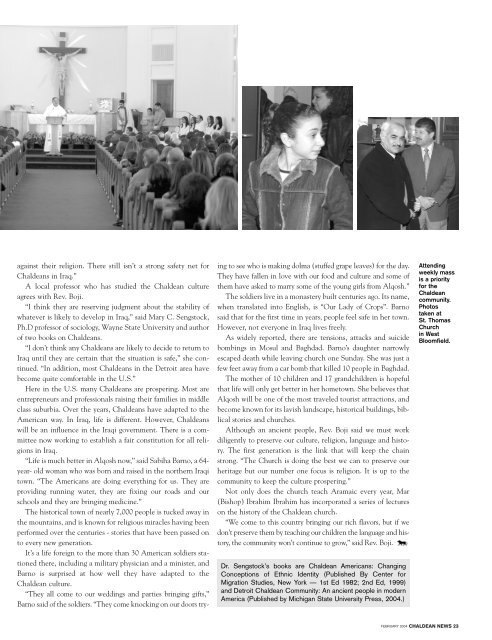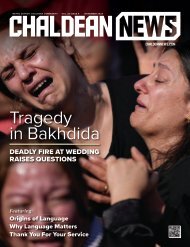You also want an ePaper? Increase the reach of your titles
YUMPU automatically turns print PDFs into web optimized ePapers that Google loves.
against their religion. There still isn’t a strong safety net for<br />
Chaldeans in Iraq.”<br />
A local professor who has studied the Chaldean culture<br />
agrees with Rev. Boji.<br />
“I think they are reserving judgment about the stability of<br />
whatever is likely to develop in Iraq,” said Mary C. Sengstock,<br />
Ph.D professor of sociology, Wayne State University and author<br />
of two books on Chaldeans.<br />
“I don’t think any Chaldeans are likely to decide to return to<br />
Iraq until they are certain that the situation is safe,” she continued.<br />
“In addition, most Chaldeans in the Detroit area have<br />
become quite comfortable in the U.S.”<br />
Here in the U.S. many Chaldeans are prospering. Most are<br />
entrepreneurs and professionals raising their families in middle<br />
class suburbia. Over the years, Chaldeans have adapted to the<br />
American way. In Iraq, life is different. However, Chaldeans<br />
will be an influence in the Iraqi government. There is a committee<br />
now working to establish a fair constitution for all religions<br />
in Iraq.<br />
“Life is much better in Alqosh now,” said Sabiha Barno, a 64-<br />
year- old woman who was born and raised in the northern Iraqi<br />
town. “The Americans are doing everything for us. They are<br />
providing running water, they are fixing our roads and our<br />
schools and they are bringing medicine.”<br />
The historical town of nearly 7,000 people is tucked away in<br />
the mountains, and is known for religious miracles having been<br />
performed over the centuries - stories that have been passed on<br />
to every new generation.<br />
It’s a life foreign to the more than 30 American soldiers stationed<br />
there, including a military physician and a minister, and<br />
Barno is surprised at how well they have adapted to the<br />
Chaldean culture.<br />
“They all come to our weddings and parties bringing gifts,”<br />
Barno said of the soldiers. “They come knocking on our doors trying<br />
to see who is making dolma (stuffed grape leaves) for the day.<br />
They have fallen in love with our food and culture and some of<br />
them have asked to marry some of the young girls from Alqosh.”<br />
The soldiers live in a monastery built centuries ago. Its name,<br />
when translated into English, is “Our Lady of Crops”. Barno<br />
said that for the first time in years, people feel safe in her town.<br />
However, not everyone in Iraq lives freely.<br />
As widely reported, there are tensions, attacks and suicide<br />
bombings in Mosul and Baghdad. Barno’s daughter narrowly<br />
escaped death while leaving church one Sunday. She was just a<br />
few feet away from a car bomb that killed 10 people in Baghdad.<br />
The mother of 10 children and 17 grandchildren is hopeful<br />
that life will only get better in her hometown. She believes that<br />
Alqosh will be one of the most traveled tourist attractions, and<br />
become known for its lavish landscape, historical buildings, biblical<br />
stories and churches.<br />
Although an ancient people, Rev. Boji said we must work<br />
diligently to preserve our culture, religion, language and history.<br />
The first generation is the link that will keep the chain<br />
strong. “The Church is doing the best we can to preserve our<br />
heritage but our number one focus is religion. It is up to the<br />
community to keep the culture prospering.”<br />
Not only does the church teach Aramaic every year, Mar<br />
(Bishop) Ibrahim Ibrahim has incorporated a series of lectures<br />
on the history of the Chaldean church.<br />
“We come to this country bringing our rich flavors, but if we<br />
don’t preserve them by teaching our children the language and history,<br />
the community won’t continue to grow,” said Rev. Boji.<br />
Dr. Sengstock’s books are Chaldean Americans: Changing<br />
Conceptions of Ethnic Identity (Published By Center for<br />
Migration Studies, New York — 1st Ed 1982; 2nd Ed, 1999)<br />
and Detroit Chaldean Community: An ancient people in modern<br />
America (Published by Michigan State University Press, <strong>2004</strong>.)<br />
Attending<br />
weekly mass<br />
is a priority<br />
for the<br />
Chaldean<br />
community.<br />
Photos<br />
taken at<br />
St. Thomas<br />
Church<br />
in West<br />
Bloomfield.<br />
<strong>FEBRUARY</strong> <strong>2004</strong> CHALDEAN NEWS 23

















